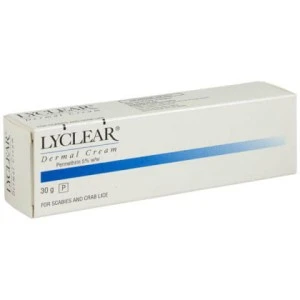Scabies
Scabies is a skin condition caused by the mite Sarcoptes scabiei, resulting in intensely itchy skin. There are two medicines you can buy online at Prescription Doctor to help with scabies: Lyclear Dermal Cream (branded) and Permethrin 5% cream (the generic version of Lyclear).
Lyclear Dermal Cream
- Used to clear scabies & crab mites
- Relief from itching within just a few hours
- Fast, discreet delivery
Permethrin 5% Cream
- Topical scabies treatment
- Generic version of Lyclear
- Discreet Delivery
What is scabies?
Scabies is caused by an infestation of tiny burrowing mites which penetrate the skin by digging tunnels. A pregnant female mite hatches eggs, and the baby mites (larvae) emerge 2-3 days later. These larvae dig new burrows, and the cycle repeats itself fortnightly. Children are most likely to be infected, but the risk of infection can occur at any age.
How is it spread?
Scabies can be transmitted through direct body-to-body contact. It is extremely contagious, often spread between two people through skin contact. It is rare for scabies to be transmitted through clothing and bedsheets unless these have been contaminated by people already infested.
Diagnosing scabies
Correct diagnosis requires a high level of suspicion and a thorough physical examination of the skin. Several family members who have suddenly developed a severe itch over a short timeframe are a key giveaway for scabies. However, itching is not always present in scabies and, in practice, it can be challenging to get your family members to admit there is a history of scabies. Common places for scabies to develop are your:
- Hands
- Arms
- Skin that is covered by jewellery or accessories.
Untreated scabies can persist for months. Even if you have tried treatments for scabies, you cannot rule it out entirely because you may have used the treatment incorrectly, or your family members may still be untreated, leading to re-infestation.
Signs and Symptoms
The most common symptoms include:
- Intense itching (pruritus) - The itching often worsens at night to the point where sleep is affected.
- Rashes – tiny, inflamed, red spots that often form lines due to excessive itching. Constantly scratching the rashes can lead to sores, which may get infected (as the skin barrier is repeatedly broken and exposed to foreign objects).
- Less commonly, severe scabies can be identified by the appearance of thick crusts on the skin.
Which treatments are available?
Scabies is not usually a serious condition, but it does require treatment. There are two main treatments available over the counter from pharmacies. Treatment involves applying creams or lotions to the skin (topical). The first-line treatments are Lyclear dermal cream or permethrin 5% cream, both of which are available on our website. These drugs work as insecticides to prevent the growth of mites and kill them, including the eggs.
The exact directions for each are found on their patient information leaflets, but there is some general advice to take note of for both. The treatments should be applied to the entire body, excluding the eyes, and include the face, neck, behind the ears, and nails. This is to ensure that all mites and any eggs are exposed to the medicine. The treatment should be left on for 8-12 hours and then removed by showering. A second application is required after a week to ensure all mites are killed. Note that successful treatment will rapidly eliminate the mites, but the itching can persist for a few weeks.
All family members should be treated simultaneously, regardless of whether they have symptoms or not, to reduce the risk of reinfection. If you have had sexual contact with anyone within the past 2 months, they should also receive treatment.
You should see your GP if you have applied the medicine twice, but the scabies infestation still has not resolved.
How to prevent scabies
Wash all clothes, bed sheets, and towels in the washing machine at 60 °C or higher to prevent the spread and re-infestation. Any clothes that cannot be washed immediately should be placed in a sealed bag for 3 days, which allows the mites to die. If your family members have scabies, do not share any clothing or personal items with them. Avoid physical or sexual contact until the full treatment has been completed.
Sources
Scabies - NHS (www.nhs.uk)
Scabies | NHS inform
Scabies - Symptoms, diagnosis and treatment | BMJ Best Practice
Authored By

Melissa Keen
Medical Content WriterPublished on: 31/10/2023
Reviewed By

Dr Giuseppe Aragona
DoctorReviewed on: 31/10/2023
© 2013 - 2026 Al Muhsineen Limited. All Rights Reserved. Registered Pharmacy: 34 Halliwell Road, Bolton BL1 8RL. Registered Office: 254 First Floor, Shearbrow, Blackburn, England, BB1 8DS








